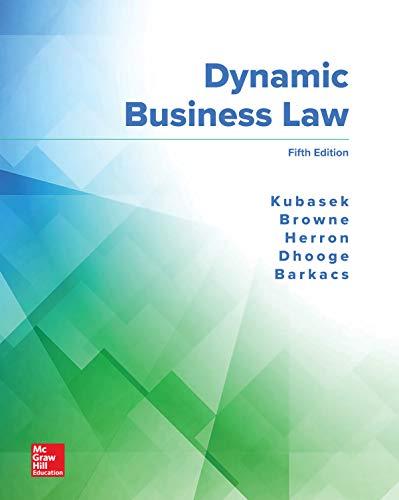Burbank Apartments Tenant Association had a project-based Section 8 housing assistance payment contract (HAP) with the United
Question:
Burbank Apartments Tenant Association had a project-based Section 8 housing assistance payment contract (HAP) with the United States Department of Housing and Urban Development. Project-based Section 8 housing is a government funded program that helps to provide rental housing to low-income households. The subsidy stays with each rental unit, meaning that applicants do not directly receive rental assistance from the government but receive it indirectly through living in price-controlled units.
Prior to the end of the HAP, Burbank decided they would not renew it and would replace projectbased housing assistance with an alternative program federal housing program based on vouchers. In the Section 8 voucher system, the federal subsidy would be awarded to low-income household who would then have the freedom to pick any apartment that accepted the voucher. In Burbank’s case, it would accept Section 8 vouchers from current and future tenants.
In March 2011, plaintiffs, comprising of current tenants, potential tenants, and various advocate filed a complaint seeking an injunction to prevent Burbank Apartment from allowing the project-based HAP to expire. The plaintiffs contended that Burbank Apartment’s decision to allow the HAP to lapse would violate the Fair Housing Act and the Massachusetts anti discrimination law because it was intentionally discriminatory and would cause a disparate impact on a protected class of citizens.
Burbank demurred. Seeing as the disparate impact claim was an issue of first impression in Massachusetts, the district court had to determine if it were legally cognizable. The claim was determined not to be. The case was appealed up to the Massachusetts Supreme Court, which granted its oral ruling on December 8, 2015, over four years after the initial motion to enjoin Burbank.
The Massachusetts Supreme Court concluded that housing discrimination claims could be pleaded on a disparate impact theory. However, the Justices still ruled in favor of Burbank and gave them leave to let the HAP end.
According to the court, what is the standard which a plaintiff must show to win a disparate impact claim? Why do you think the standard is so stringent? What kind of argument would plaintiffs have had to make or what kind of evidence would plaintiffs have had to show for the Massachusetts Supreme Court to have ruled in their favor under a disparate impact theory?
Step by Step Answer:

Dynamic Business Law
ISBN: 9781260247893
5th Edition
Authors: Nancy Kubasek, M. Neil Browne, Daniel Herron, Lucien Dhooge, Linda Barkacs





